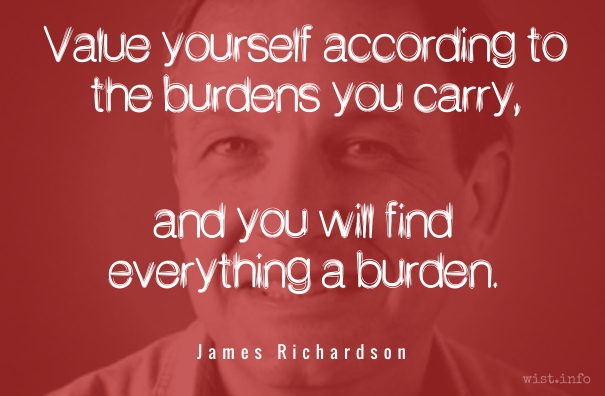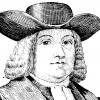So this idea of doing good to others only for their sake is absurd. You want to do it, not simply for their sake, but for your own; because a perfectly civilized man can never be perfectly happy while there is one unhappy being in this universe.
Robert Green Ingersoll (1833-1899) American lawyer, agnostic, orator
Speech (1886-11-14), “A Lay Sermon,” American Secular Union annual congress, Chickering Hall, New York City
(Source)
Quotations about:
self-sacrifice
Note not all quotations have been tagged, so Search may find additional quotes on this topic.
In a valiant suffering for others, not in a slothful making others suffer for us, did nobleness ever lie.
Thomas Carlyle (1795-1881) Scottish essayist and historian
Past and Present, Book 2, ch. 8 “Unworking Aristocracy” (1843)
(Source)
Besides justifying the transfer of wealth to kleptocrats, institutionalized religion brings two other important benefits to centralized societies. First, shared ideology or religion helps solve the problem of how unrelated individuals are able to live together without killing each other — by providing them with a bond not based on kinship. Second, it gives people a motive, other than genetic self-interest, for sacrificing their lives on behalf of others.
Jared Diamond (b. 1937) American geographer, historian, ornithologist, author
Guns, Germs, and Steel, ch. 14 (1997)
(Source)
So when, in future times, men ask you to prove patriotism and loyalty and affection for your native land — remember that these things are not always equated with a willingness to die or to kill.
Rod Serling (1924-1975) American screenwriter, playwright, television producer, narrator
Commencement Address, Ithaca College, New York (13 May 1972)
(Source)
Remember that you can’t necessarily sanctify a cause by virtue of the fact that men die for it. A death in a worthless or even questionable cause is a pointless, meaningless, tragically premature death.
Rod Serling (1924-1975) American screenwriter, playwright, television producer, narrator
Commencement Address, Ithaca College, New York (13 May 1972)
(Source)
You can always hear the people who are willing to sacrifice somebody else’s life. They’re plenty loud and they talk all the time. You can find them in churches and schools and newspapers and congresses. That’s their business. They sound wonderful. Death before dishonor. This ground sanctified by blood. These men who died so gloriously. They shall not have died in vain. Our noble dead.
Hmmmm.
But what do the dead say?
Did anybody ever come back from the dead any single one of the millions who got killed did any one of them ever come back and say by god I’m glad I’m dead because death is always better than dishonor? Did they say I’m glad i died to make the world safe for democracy? Did they say i like death better than losing liberty? Did any of them ever say it’s good to think i got my guts blown out for the honor of my country? Did any of them ever say look at me i’m dead but i died for decency and that’s better than being alive? Did any of them ever say here i am, i’ve been rotting for two years in a foreign grave but it’s wonderful to die for your native land? Did any of them say hurray I died for womanhood and I’m happy, see how I sing even though my mouth is choked with worms?
Dalton Trumbo (1905-1976) American screenwriter and novelist [James Dalton Trumbo]
Johnny Got His Gun (1938)
(Source)
He who gives only what he would as readily throw away gives without generosity; for the essence of generosity is in self-sacrifice.
Henry Taylor (1800-1886) English dramatist, poet, bureaucrat, man of letters
“Money,” Notes from Life (1847)
(Source)
I disapprove of what you say, but I will defend to the death your right to say it.
Voltaire (1694-1778) French writer [pseud. of Francois-Marie Arouet]
(Misattributed)
(Source)
The words are not found in any Voltaire and actually belong to historian Evelyn Beatrice Hall, writing as S. G. Tallentyre in The Friends of Voltaire (1906), describing an 1759 incident where Voltaire learned that Claude-Adrien Helvétius' book On the Mind [De l’esprit] had been burned (along with Voltaire's own "On Natural Law") after condemnation by the Paris Parliament and the Sorbonne.‘What a fuss about an omelette!’ he had exclaimed when he heard of the burning. How abominably unjust to persecute a man for such an airy trifle as that! ‘I disapprove of what you say, but I will defend to the death your right to say it,’ was his attitude now.Hall later wrote to a friend that the actual words were her own and ought not to have had quotation marks.
Variations:More information here.
- I wholly disapprove of what you say -- and will defend to the death your right to say it.
- Monsieur l’Abbé, je déteste ce que vous écrivez, mais je donnerais ma vie pour que vous puissiez continuer à écrire.
If you asked twenty good men today what they thought the highest of the virtues, nineteen of them would reply, Unselfishness. But if you asked almost any of the great Christians of old he would have replied, Love. You see what has happened? A negative term has been substituted for a positive, and this is of more than philological importance. The negative ideal of Unselfishness carries with it the suggestion not primarily of securing good things for others, but of going without them ourselves, as if our abstinence and not their happiness was the important point. I do not think this is the Christian virtue of Love.
Greater love hath no man than this, that a man lay down his life for his friends.
The Bible (The New Testament) (AD 1st - 2nd C) Christian sacred scripture
John 15:13 [KJV (1611)]
(Source)
Alternate translations:A man can have no greater love than to lay down his life for his friends.
[JB (1966)]The greatest love you can have for your friends is to give your life for them.
[GNT (1976)]No one can have greater love than to lay down his life for his friends.
[NJB (1985)]No one has greater love than to give up one’s life for one’s friends.
[CEB (2011)]No one has greater love than this, to lay down one’s life for one’s friends.
[NRSV (2021 ed.)]
I think that if the beast who sleeps in man could be held down by threats — any kind of threat, whether of jail or of retribution after death — then the highest emblem of humanity would be the lion tamer in the circus with his whip, not the prophet who sacrificed himself. But don’t you see, this is just the point — what has for centuries raised man above the beast is not the cudgel but an inward music: the irresistible power of unarmed truth, the powerful attraction of its example.
Boris Pasternak (1890-1960) Russian poet, novelist, and literary translator
Doctor Zhivago [До́ктор Жива́го], Part 1, ch. 2 “A Girl from a Different World” [Nikolai] (1955) [tr. Hayward & Harari (1958), US ed.]
(Source)
Alternate translations:I think that if the beast who sleeps in man could be held down by threats -- any kind of threat, whether of jail or of retribution after death -- then the highest emblem of humanity would be the lion tamer in the circus with his whip, not the self-sacrificing preacher. But don’t you see, this is just the point -- what has for centuries raised man above the beast is not the cudgel but an inward music: the irresistible power of unarmed truth, the attraction of its example.
[tr. Hayward & Harari (1958), UK ed.]I think that if the beast who sleeps in man could be held down by threats -- any kind of threat, whether of jail or of retribution after death -- then the highest emblem of humanity would be the lion tamer in the circus with his whip, not the prophet who sacrificed himself. But this is just the point -- what has for centuries raised man above the beast is not the cudgel, but an inward music -- the irresistible power of unarmed truth.
[tr. Hayward & Harrai (1958); edited version quoted by Ronald Reagan, Moscow State University (1988-05-31)]I think that if the beast dormant in man could be stopped by the threat of, whatever, the lockup or requital beyond the grave, the highest emblem of mankind would be a lion tamer with his whip, and not the preacher who sacrifices himself. But the point is precisely this, that for centuries man has been raised above the animals and borne aloft not by the rod, but by music: the irresistibility of the unarmed truth, the attraction of its example.
[tr. Pevear & Volokhonsky (2010), "A Girl from a Different Circle"]
Neither urge another to that thou wouldst be unwilling to do thyself, nor do thyself what looks to thee unseemly and intemperate in another.
William Penn (1644-1718) English writer, philosopher, politician, statesman
Some Fruits of Solitude, # 71 (1693)
See also Matthew 7:12.
The reason I don’t worry about society is, nineteen people knocked down two buildings and killed thousands. Hundreds of people ran into those buildings to save them. I’ll take those odds every fucking day.














